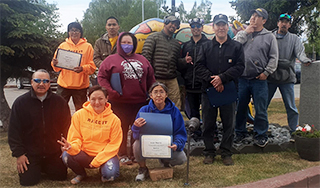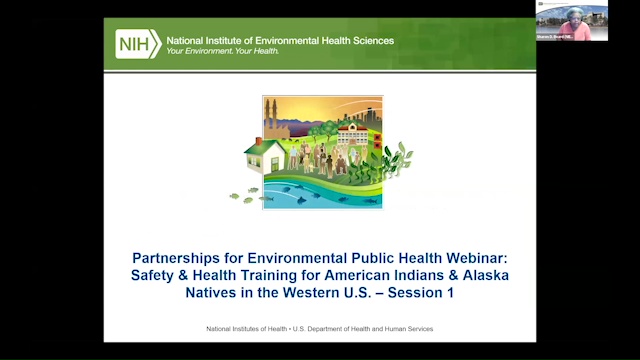Partnerships for Environmental Public Health (PEPH)
December 7, 2022 • 2:00 p.m. ET

Many American Indian and Alaska Native communities face unique challenges in training and safeguarding their workers in jobs related to environmental health or protection. Given their relative geographic isolation, tribal governments and residents often must deal on their own with solid and hazardous waste management. Transportation and infrastructure limitations make practices, like backhauling of waste, cost prohibitive.
A shortage of trained technicians in waste management means that many communities face increased risks for environmental contamination. Also, residents are frequently the first line of defense in responding to disasters, such as floods, earthquakes, oil spills, or other hazmat incidents, because trained outside responders typically are not immediately available.
The Western Region Universities Consortium (WRUC), funded by the NIEHS Worker Training Program, partners with tribal entities in the Southwest, Pacific Northwest, and Alaska to provide training on hazardous waste, hazmat transport, and emergency response, specifically in underserved and remote tribal communities.
This webinar described these training activities with particular focus on the Western Region Universities Consortium partnership and collaboration with Zender Environmental and their Rural Alaska Community Environmental Job Training (RACEJT) program. The program offers environmental training and job pathways for unemployed residents of rural Alaska communities disproportionately impacted by environmental health exposures.

Presenters

Kevin Riley Ph.D., is the director of the the UCLA Labor Occupational Safety and Health (LOSH) program in Los Angeles, and principal investigator for the Western Region Universities Consortium. With over a decade of experience conducting worker- and community-engaged research and worker training initiatives, he leads LOSH efforts to investigate job hazards among workers in various industries and sectors, with the goal of informing public policy and improving workplace health and safety programs. His work has examined the injury experiences of workers in the low-wage labor market, community-level associations between heat-related hospitalizations and outdoor work, and workers’ compensation eligibility and access among residential day laborers and domestic workers. His interests also include the history of occupational safety and health policies and activism.

Mike Dunn, Ph.D., is the program manager for the Western Region Universities Consortium site at the University of Washington for the NIEHS Worker Education and Training Program. Since joining the university in 2003, Dunn has been actively involved in continuing education through various roles across campus entities and has extensive experience in the administration of health and safety training, locally and nationally. He served as product manager for 108 certificate programs for the University of Washington’s professional and continuing education unit. He served as the director of the Pacific Northwest Education Center and the director of continuing education for the university’s Department of Environmental and Occupational Health Sciences. He has actively fostered key partnerships with organizations who serve the aims of NIEHS Worker Education and Training Program.

Lynn Zender, Ph.D., is the executive director of Zender Environmental Health & Research Group, a non-profit 501(c)(3) organization. Zender received her doctorate in civil and environmental engineering from the University of California, Davis, in 1999 and holds a master’s in environmental systems modeling from Humboldt State University. Zender has worked with tribes and rural communities since 1994 and is recognized as an expert in Arctic small community solid waste practices and health risks. Her passion is working with small community and tribal programs to attain facilities and practices that are health protective, as defined by the community. While these programs face far greater challenges than their larger counterparts, they also possess unique capacity to address them. Zender has visited environmental program staff in over 60 off-road communities, which is a part of her work that she especially appreciates.
We Want Your Feedback!
Send comments, questions, and suggestions for future webinar topics to [email protected].


